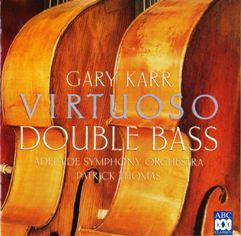Virtuoso Double Bass (Gary Kerr) [1992]
Virtuoso Double Bass (Gary Kerr) [1992]

Edvard Grieg (1843-1907)
trans. Gary Karr, orch. Joseph Horovitz
Concerto for Double Bass and Orchestra in A minor
Wilfred Josephs (1927-1997)
Concerto for Double Bass and Orchestra, Op. 118
Stuart Sankey (1927-2000)
Carmen Fantasy after Bizet
Gary Karr - double bass
Adelaide Symphony Orchestra
Patrick Thomas – conductor
I first came across Gary Karr, when, as a very young record collector, I was given a recording of Saint-Saëns’ Carnival of the Animals conducted by Bernstein (BRG 72072). On this 1962 LP Bernstein had deliberately selected some outstanding teenage musicians to play the work and Gary Karr was one of them. In fact he played The Swan normally heard on the cello but here on the double bass and Bernstein was obviously most moved by his performance as he said in his narration on the record. Aged only 19, Karr was already obtaining a uniquely strong, distinctive, lyrical and eloquent sound out of an instrument, which no one was taking seriously. It has been Karr’s obsession to reverse the public’s perception of this heavy, grumbling instrument and he is well on the way. He is the first full-time professional solo double-bassist in history according to his website and I for one would not like to disagree.
This 1992 recording is released in Europe for the first time. It is interesting to consider that, now 10 years on, Gary Karr has gone on to bigger and even greater things although his performances in Britain are still all too rare.
I will go through these three works in turn starting with Stuart Sankey’s extraordinary Carmen Fantasy. This is not of course the first of its ilk. Just recently there has been one recorded by the late Buxton Orr. Other more famous string examples would include the one by Sarasate. Sankey’s is a very clever and enjoyable example using a large orchestra. After a portentous start the bass has a virtuoso cadenza. Immediately the problem of recorded balance rears its head. You need to turn up the volume here having kept it lower for the opening. This difficulty haunts the entire piece. I hasten to add that the composer may be trying to use the bass as if it were a cello; indeed I asked myself if the piece would work even better on a cello.
Similar questions and problems of recorded balance are found in the Grieg. Here, Karr has taken the cello original and transcribed and voiced it more effectively for the bass. He then asked Joe Horovitz to orchestrate it which he has done with clarity and imagination. The excellent notes by Cyrus Meher-Homji explain that the transcription "came about partly through Gary Karr’s concern that there was little in the double bass repertory that was as familiar to audiences as opposed to some of the more well-known concertos." This is all very laudable, and really quite successful. But I then heard the original Cello Sonata. This is played by David Finckel and Wu Han on a very fine BBC Music Magazine CD - well worth seeking out. What is lacking from the new version is the emotional power at the climaxes. The tuning is also unsure, even more significant with an orchestra to contend with. Incidentally the finale in the bass version is a clever reworking and shortening of the original so as to avoid some particularly unsuitable passages.
To see how a double bass concerto can really work try Wilfred Josephs’ 30-minute concerto. This is well worth listening to carefully. I would also draw readers’ attention to the concerto by Peter Maxwell Davies on now-deleted Collins 13962. The Josephs begins with a heartfelt recitative, which could almost be a tone-row. The opening movement is the longest and reaches a grand climax. It is marked Allegretto but seems to show little tempo contrast with the second which is marked Adagio ma non troppo. The finale is a Moderato marziale which reminded me a little of the BBC television score Josephs wrote in the late ’60s for the ‘The Great War’ series. Its use of the very bottom register is most telling, especially when accompanied by bassoon and trombone. There is an element of the circus here, which the concerto needs at this point. The bass in this ten-year-old recording seems too recessed and the brass has been vividly recorded so that a brass chord bounces out of the speakers rather like a raspberry.
So, all in all, I can’t get too excited by this disc, but for aficionados of the bass or indeed of modern concertos this would at the very least be an interesting purchase. ---Gary Higginson, musicweb-international.com
download: uploaded anonfiles yandex 4shared solidfiles mediafire mega filecloudio
Zmieniony (Piątek, 18 Październik 2013 13:02)








